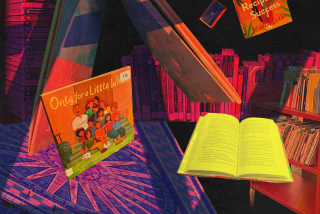Commentary : Library Card Is a Cherished Gift
- Share via
On my seventh birthday my father took me to the library for the first time. Until then books of my own were a rarity, unaffordable. I read at school, but that was reading so that when you grew up you would be able to read a letter, a menu, a newspaper. Occasionally someone gave me a book for my birthday, a grown-up’s idea of what a child should read.
Until my father took me to the library, I was like the other children on the block, playing hopscotch on the sidewalk in front of our apartment or careening wildly down the sidewalk on my roller skates.
Everyone I knew and loved lived within calling range of my mother’s loud voice. I lived with my mother and father, baby sister and maternal grandparents in an apartment on Soto Street in East Los Angeles. My mother’s sister lived upstairs with her husband and children and her husband’s mother. Two doors down in a small court near the corner lived my paternal grandmother and another aunt and cousin.
Our apartment was always full of relatives and neighbors, eating, laughing, arguing, playing cards. In the evenings my uncle played the violin in the living room or the radio blared unlistened to, drowned out by the noise of people talking and joking. Nobody read.
Except my father.
“Laddie’s reading,” my mother would say in apology for my father’s silence as he sat in the overstuffed chair in a corner of the living room, a book in his hands, his face crossed by the dim light of the standing lamp.
My father’s reading set him apart from the rest of us. I longed to join him in his absorption. There was nothing in the few books that I had that held my attention that way.
“Where are you going, Laddie?” someone would invariably ask my father as he gathered up his books and headed out the door.
“He’s going to the library,” my mother would proudly answer for him.
As my seventh birthday approached, my mother asked me what present I’d like. My father sat nearby reading.
“A library book,” I said.
My mother looked worried. “You’re too young,” she said, glancing at my father.
He closed his book, stroking the cloth over thoughtfully.
On the day of my birthday, my mother baked two big cakes and neighbors and relatives crowded into the cramped kitchen to watch me blow out the candles. Then I opened the gifts--new roller skates, a Chinese checkers game, blue pajamas with satiny stripes running through the material, a jump rope with multicolored, twisted-braid handles.
My uncle began to play a wild tzigane melody on his violin, luring everyone into the living room. My younger aunt grabbed her husband’s hand and began dancing while the rest of the grown-ups clapped their hands in time to the music. My cousins and I remained in the kitchen, sitting cross-legged on the cold linoleum floor, Chinese checkers board and brightly colored marbles spread out in front of us. We drank purple punch and laughed at the mustaches that it made on our upper lips.
I looked up to see my father watching us from his place in the kitchen doorway. I got up and walked toward him. Slipping my hand into his, I felt an unfathomable connection between us.
My cousins chased each other around the table, the Chinese checkers and mustaches forgotten. I watched from my father’s side, his hand resting gently on my shoulder.
“Cake brings ants,” pronounced my mother, scooping up the remnants of cake and wrapping them in waxed paper. My grandmother stood at the sink washing dishes with water that made a groaning sound as it came out of the pipes.
“Go get your coat,” my father said to me in a low voice.
My mother, always tuned into any sound from my father, heard him over the noise of rustling paper and rushing water, over the sound of Gypsy music and clapping hands.
“And lace your shoes,” she said, looking at me with the same proud look that she reserved for my father.
“Where’s Nina going?” my cousins asked as I walked to the door with my father, my mother following close behind us. My uncle stopped playing the violin. It was absolutely quiet as everyone’s eyes turned to my father and me.
At the door my mother bent and buttoned the buttons that I had left undone beneath my chin. “They’re going to the library,” she said in a voice full of satisfaction.
My father died in 1975. He never knew that I was a writer. I like to imagine that he knows that I am one. I like to think that he would enjoy the books that I write. But he knew that I was a reader, because he got me my first library card and we spent many silent times together, each lost in a book. I was too young to know what a gift he gave me. I know now. My world expanded beyond the neighborhood, beyond the family, beyond the crowded and noisy apartment. Most of the people who seemed such an indispensable part of my life that day are gone, but I think of them often, and when I do it’s with a vividness that no other memories hold for me, because that was the day that my father first took me to the library.


